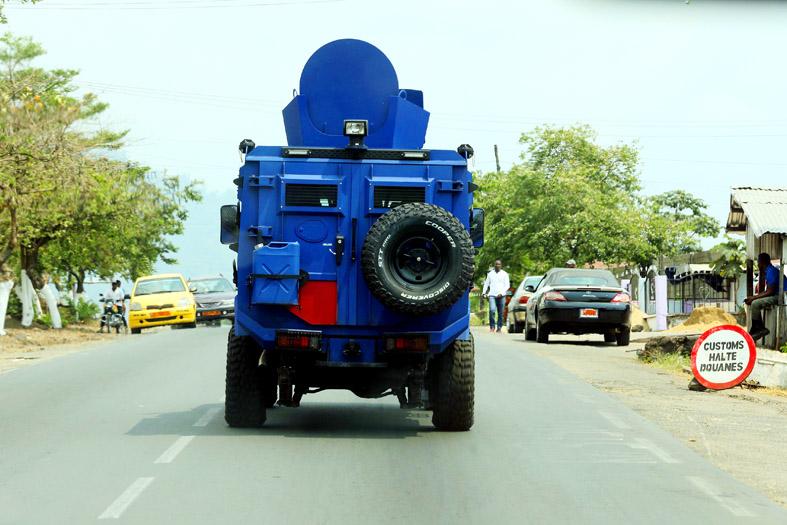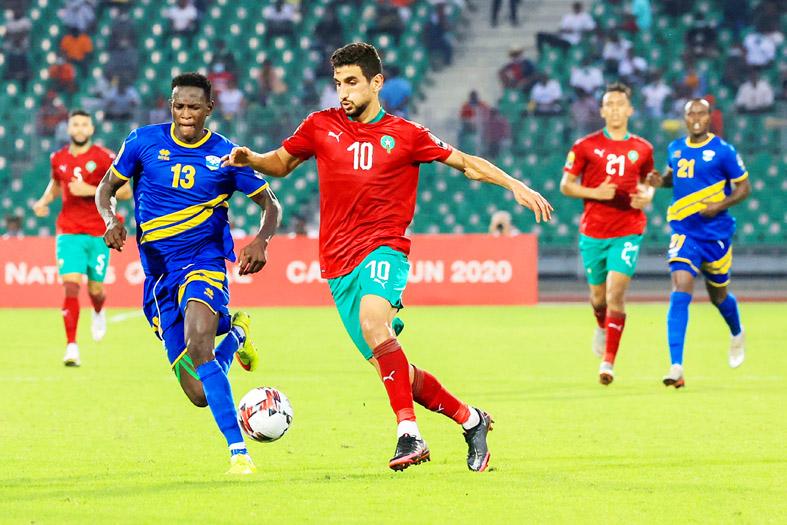A stone’s throw from the Mungo River, which partly marks the dividing line between Cameroon’s anglophone and francophone regions, stand armored vehicles and trucks filled with soldiers. They have been there on careful watch since the African Nations Championship (CHAN) got under way on Jan. 16 with the home side’s 1-0 win over Zimbabwe in Yaounde.
CHAN is a long way from being the most important football tournament in the world; it is not even the biggest tournament in Africa.
However, the competition has taken on a more significant role as the Cameroonian hosts run the dress rehearsal for next year’s far more important African Cup of Nations (CAN) while handling COVID-19 and a deadly domestic war.

Photo: AFP
This is the first major international football tournament in the world since the start of the COVID-19 pandemic.
The greater fear resides in the ongoing conflict in the west of the country.
Cameroon’s northwest and southwest regions have for more than three years been the theater of a bloody conflict between government forces and armed separatists.

Photo: AFP
Civilians are often caught up in the fighting, suffering at the hands of both sides, international aid groups and the UN say.
So far more than 3,000 people have died and more than 700,000 have fled their homes during the conflict.
Some armed groups have promised to disrupt CHAN. Along the banks of the Mungo — a symbol of the amalgamation in 1961 of Cameroon following French and British rule after World War I — police and military personnel have been boosted strengthened.
With the quarter-finals having starting on Saturday, fears are rising in Limbe, a town that will host one of the semi-finals, and in Buea, the region’s capital, which is the training center for some of the teams.
Ahead of Wednesday last week’s game between Zambia and Namibia in Limbe, the villages located along the road connecting this seaside town to Douala were almost deserted.
The armed separatists, nicknamed “Amba Boys” because they want to call the territory Ambazonia once they secure independence, stage “ghost town” operations every Monday, prohibiting any activity where they can.
However, since the opening of CHAN, “ghost town” has been decreed every day, including on the eve of the match in Limbe.
Usually very lively, the small towns of Tiko and Mutengene, between Buea and Limbe, were sealed off on Wednesday.
“It is normal that we are on alert,” a police officer in Buea said. “The enemies of peace are there, still active despite everything.”
On the road, as in Buea, light armored patrols crisscross the city, sometimes at high speed and other times at walking pace, but always with machine guns at the ready.
In Limbe, each match brings a new and very palpable sense of fear.
On Tuesday “everyone took shelter after a bomb explosion” near the stadium, 19-year-old Harris said.
On this occasion, there were no casualties. As a result, Harris opted “out of caution” not to go and see the Wednesday’s Zambia-Namibia match as he had planned.
As the competition rolls on toward the final on Sunday, Cameroon holds its breath.

Shohei Ohtani and Clayton Kershaw on Friday joined their Los Angeles Dodgers teammates in sticking their fists out to show off their glittering World Series rings at a ceremony. “There’s just a lot of excitement, probably more than I can ever recall with the Dodger fan base and our players,” manager Dave Roberts said before Los Angeles rallied to beat the Detroit Tigers 8-5 in 10 innings. “What a way to cap off the first two days of celebrations,” Roberts said afterward. “By far the best opening week I’ve ever experienced. I just couldn’t have scripted it any better.” A choir in the

After fleeing Sudan when civil war erupted, Al-Hilal captain Mohamed Abdelrahman and his teammates have defied the odds to reach the CAF Champions League quarter-finals. They are today to face title-holders Al-Ahly of Egypt in Cairo, with the return match in the Mauritanian capital, Nouakchott, on Tuesday next week. Al-Hilal and biggest domestic rivals Al-Merrikh relocated to Mauritania after a power struggle broke out in April 2023 between the Sudanese army and a paramilitary force. The civil war has claimed tens of thousands of lives and displaced more than 12 million people, according to the UN. The Democratic Republic of the Congo-born Al-Hilal

The famously raucous Hong Kong Sevens are to start today in a big test for a shiny new stadium at the heart of a major US$3.85 billion sports park in the territory. Officials are keeping their fingers crossed that the premier event in Hong Kong’s sporting and social calendar goes off without a hitch at the 50,000-seat Kai Tak Stadium. They hope to entice major European soccer teams to visit in the next few months, with reports in December last year saying that Liverpool were in talks about a pre-season tour. Coldplay are to perform there next month, all part of Hong Kong’s

Shohei Ohtani, Teoscar Hernandez and Tommy Edman on Thursday smashed home runs to give the reigning World Series champions the Los Angeles Dodgers a 5-4 victory over Detroit on the MLB’s opening day in the US. The Dodgers, who won two season-opening games in Tokyo last week, raised their championship banner on a day when 28 clubs launched the season in the US. Dodgers manager Dave Roberts shuffled his batting lineup with all four leadoff hitters finally healthy as Ohtani was followed by Mookie Betts, then Hernandez and Freddie Freeman in the cleanup spot, switching places with Hernandez. “There’s a Teoscar tax to